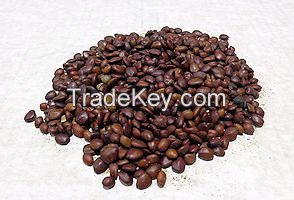


FOB Price
Get Latest Price( Negotiable )
|- Minimum Order
Country:
Morocco
Model No:
AFFS0012
FOB Price:
( Negotiable ) Get Latest Price
Place of Origin:
Morocco
Price for Minimum Order:
-
Minimum Order Quantity:
-
Packaging Detail:
PP Bag
Delivery Time:
7 to 30 days delivery time depends on order
Supplying Ability:
-
Payment Type:
T/T, L/C
Product Group :
-
Morocco
Contact Person Mr. Abdelmajid
Usine Km 10 Ourika Road- Marrakech B.P : 7034 - Sidi Abbad, Marrakech
English Name: Carob
Seeds
Botanical Name: Ceratonia
Siliqua
Description:
Conventional
Origin:
Morocco
Details:
Health Benefits Of Carob
Carob is an evergreen flowering shrub, belonging
to the pea family. Native to the Mediterranean region especially in
the eastern and southern area of Spain, carob is cultivated for its
edible seeds. It is found in its natural form in Southern Anatolia,
Cyprus, Syria, Greece, Spain, Morocco, Tunisia, Algeria, Libya and
Israel. Consumed since ancient times, it is also known as Saint
Johns Bread or locust bean. The dried carob fruit is traditionally
consumed on Jewish holidays and the juice is taken by Muslims,
during the Islamic month of Ramadan. It is used as a substitute in
making various products such as baked goods, bars, snacks, cereal,
dairy products, cocoa-containing products and beverages. Read on
further to know the different health and nutrition benefits of
eating carob and also find its nutritional
value.
Nutritional Value of
Carob
Amount of Carob Flour: 1
cup
Total Weight of Carob Flour: 103
g
| Nutrients | Amount |
| Basic Components | |
| Protein | 4.8 g |
| Water | 3.7 g |
| Ash | 2.3 g |
| Calories | |
| Total Calories | 229 |
| Calories From Carbohydrate | 204 |
| Calories From Fat | 6 |
| Calories From Protein | 19 |
| Carbohydrates | |
| Total Carbohydrate | 91.6 g |
| Dietary Fiber | 41 g |
| Sugars | 50.5 g |
| Fats & Fatty Acids | |
| Total Fat | 0.7 g |
| Saturated Fat | 0.1 g |
| Monounsaturated Fat | 0.2 g |
| Polyunsaturated Fat | 0.2 g |
| Total Omega-3 Fatty Acids | 4.1 mg |
| Total Omega-6 Fatty Acids | 218 mg |
| Vitamins | |
| Vitamin A | 14.4 IU |
| Vitamin C | 0.2 mg |
| Vitamin E (Alpha Tocopherol) | 0.6 mg |
| Thiamin | 0.1 mg |
| Riboflavin | 0.5 mg |
| Niacin | 2 mg |
| Vitamin B6 | 0.4 mg |
| Folate | 29.9 mcg |
| Choline | 12.3 mg |
| Minerals | |
| Calcium | 358 mg |
| Iron | 3 mg |
| Magnesium | 55.6 mg |
| Phosphorus | 81.4 mg |
| Potassium | 852 mg |
| Sodium | 36.1 mg |
| Zinc | 0.9 mg |
| Copper | 0.6 mg |
| Manganese | 0.5 mg |
| Selenium | 5.5 mcg |

| Country: | Morocco |
| Model No: | AFFS0012 |
| FOB Price: | ( Negotiable ) Get Latest Price |
| Place of Origin: | Morocco |
| Price for Minimum Order: | - |
| Minimum Order Quantity: | - |
| Packaging Detail: | PP Bag |
| Delivery Time: | 7 to 30 days delivery time depends on order |
| Supplying Ability: | - |
| Payment Type: | T/T, L/C |
| Product Group : | - |